Politics
Cold war in APC deepens
Published
8 years agoon
By
Olu Emmanuel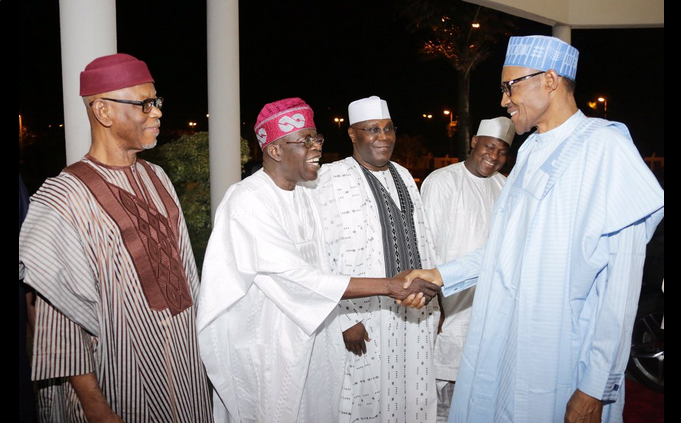
- Buhari losing party control
The surreptitious cold war that has been ravaging the All Progressives Congress (APC) since the inauguration of President Muhammadu Buhari on May 29, 2015, is subtly getting to high altitude, revealing symptoms of looming implosion of the ruling party in the build up to 2019.
The crux of the cold war has been the seeming deliberate exclusion of APC leaders who were in the vanguard of the negotiation, formation, electioneering campaigns and mobilization for elections and the subsequent victory of the APC in 2015 from the APC’s political machine that influences or determines who gets what, when and how from both party and federal government patronage or distribution of the booties of the political war with the Peoples Democratic Party (PDP).
President Buhari from the inchoate stage of the APC regime in 2015 has been handling government affairs as though the victory of the APC was a sole effort of the Congress for Progressive Change (CPC) or his personal political clout. Leaders of other legacy or coopted parties that brought steam to the APC have perpetually been neglected on issues of appointments and party control. The President appears to be hypothetically grooming new breed of leaders from respective geo-political zones to transplant their godfathers or mentors.
Apparently, leaders of the Action Congress of Nigeria (ACN) like Asiwaju Bola Ahmed Tinubu, Chief Bisi Akande; the nPDP like former Vice President Atiku Abubakar, Senator Rabi’u Musa Kwankwaso and others, have been relegated into political oblivion by the emergent APC government under Buhari’s leadership.
They were not only relegated to political oblivion, their political dynasties have been under siege as well as the case of Tinubu in the South West.
While APC leaders pretend in public that all is well; subtle power tussle from within has been generating acrimony among party stakeholders over control or influence over both APC structures and the party government.
These precipitated seeming cold war in the APC government which has infested both the party leadership and the federal government, which subsequently degenerate into loss of cohesion, harmony, cooperation and unity of purpose in the party and federal government.
Having been eliminated from the decision making process of the government and party, the leaders conversely abandoned President Buhari and the new breed leaders being nurtured by Buhari.
ALSO SEE: Buhari under fresh pressure
The party leaders have been concentrating on rebuilding and consolidating their political fortes in the buildup to 2019.
There were reports of Tinubu indicating interest for 2019 presidential race which caused relative upset in the presidency and APC. While that ambition has not been completely erased but merely hung on certain conditions, former Vice President Atiku Abubakar has been working assiduously on his 2019 project.
Hajia Aisha Alhassan, Minister of Women Affairs and Social Development, steered unusual public discourse when she visited Atiku Abubakar in Yola, during Sallah.
Aisha Alhassan, in a seeming misrepresented report, was said to have declared support for Atiku and abandoning Buhari for the 2019 presidential race. The minster was accused of disloyalty to President Buhari, who many believe, may seek re-election in 2019.
Aisha Alhassan, however, maintained that Atiku Abubakar has been her political mentor over the years and still a member of APC. She affirmed that her loyalty to Buhari and his administration remains unshakable.
She had declared; “In a nation where politicians are quick to dump the people that assisted them to get to where they are, for political expediency, I have chosen to maintain a long standing family relationship with Abubakar, as well as Buhari, who I consider as a father.
“Besides, neither Buhari nor Abubakar has officially told anyone of an interest in seeking election in 2019.”
Meanwhile, Atiku had, on Wednesday, let the cat pout of the bag that he has been sidelined by the Buhari administration after he had mobilized his contacts and resources to help APC defeat PDP in the 2015 general elections.
“Honestly speaking, I’m still a member of the APC; I was part of all the processes, including campaigns until success was achieved.
“But sadly, soon after the formation of government; I was side-lined, I have no any relationship with the government, I’ve not been contacted even once to comment on anything and in turn, I maintained my distance. They used our money and influence to get to where they are but three years down the lane, this is where we are,” Atiku had declared.
The edging out of the notable APC leaders from the stake of authoritative allocation of privileges or opportunities to party stakeholders has been an APC phenomenon triggering disharmony of interests, surreptitious power tussles giving currency to internal cold war in the party which emasculated the party leadership and disorganized the party government.
National Daily investigation revealed that the power configuration is such that APC leaders eliminated from control or influence in government and party are politically stronger and more powerful than those in government and party leadership. They control organic loyalty from the grassroots supporters in their zones.
Those in government and party leadership lack effective control of the grassroots population and party loyalists; they only dominate mechanical loyalty derivable from the use of state powers or government institutions to impose their aspirations.
Thus government has remained in cohesive; APC leaders lack enforcement powers. The scenario e created apparent stalemate in government and party leadership.
ALSO SEE: Four dominant groups fighting Cold War in APC Govt
A perceived cabal has become prominent in the Buhari administration which notable APC stakeholders, including Buhari’s wife, have protested over time.
The consequence is that APC leaders abandoned President Buhari either in self-protection or in pursuit of 2019 agenda.
More so, APC has remained a theatre of internal conflicts between principal officers in government, and obvious disconnect between the National Assembly and the Presidency, by extension, disconnect within the executive arm of government.
It is the obvious that Atiku’s presidential ambition predates the alliance with Buhari. So, the former Vice President has been working assiduously for his 2019 presidential project irrespective of whether Buhari is seeking re-election or not. Atiku has not been the giving supporting the president on the economy, or the polity which is under threat of disintegration.
Asiwaju Tinubu’s experience in the Ondo State governorship election exposed him to the danger signal of the plot to destroy him politically. Accordingly, he separated himself from activities of APC.
It is noticeable that the prominent APC leaders has maintained Pacific silence over the ravaging conflicts in the party government and the weakness of APC leaders to intervene in the internal wrangling. APC leaders lack the capacity to initiate reconciliation or enforce discipline among elected and appointed party members in government because they are weaker than those edged out of party control.
The emerging indicators reveal that 2019 holds a lot for the ruling party, except there is urgent review of intra-party relations or a possible fresh negotiation.
You may like
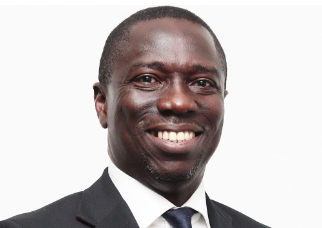

Ighodalo confident in Judiciary as He challenges Edo Governorship election results
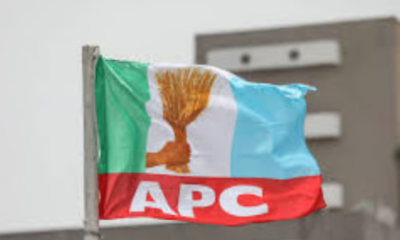

INEC Refutes APC claims of BVAS smuggling in Edo Governorship Election
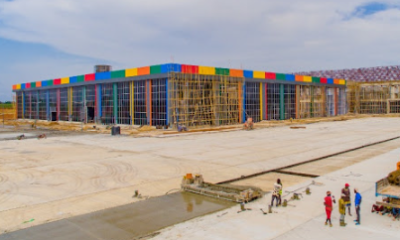

Flight operations at Ebonyi’s Chuba Okadigbo Airport set to begin in November
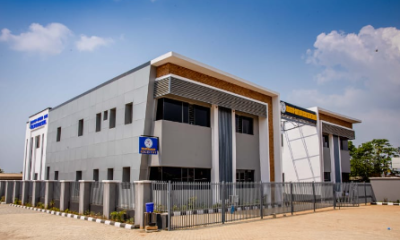

Igbogbo-Baiyeku LCDA inaugurates new legislative building
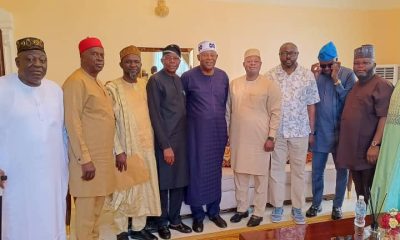

Faleke meets APC State Chairmen
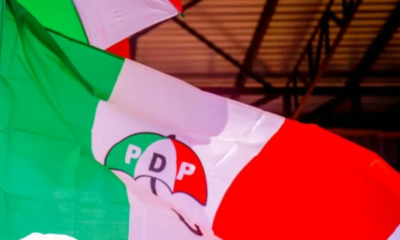

PDP slams APC over criticism of NSE visit to Osun State
Trending
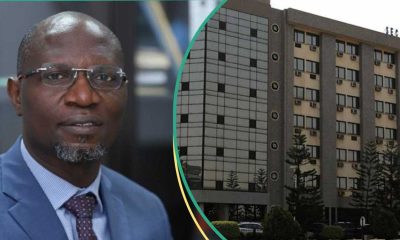
 Business6 days ago
Business6 days agoSEC declares CBEX, other unregistered digital platforms illegal

 Health1 week ago
Health1 week agoMen with larger breasts face higher risk of breast cancer — Health Ministry
- Health7 days ago
Doctor marks birthday with free healthcare to 500 indigents in Kwara

 Business3 days ago
Business3 days agoAdesina urges African nations to end raw material exports, embrace industrialisation
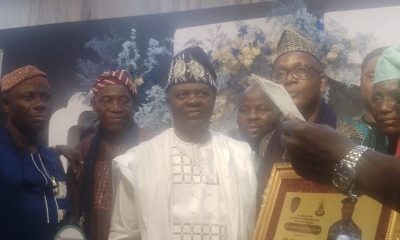
 Alausa Watch1 week ago
Alausa Watch1 week agoACP Abayomi Faniyi Bows Out in Grand Style After a Distinguished Career
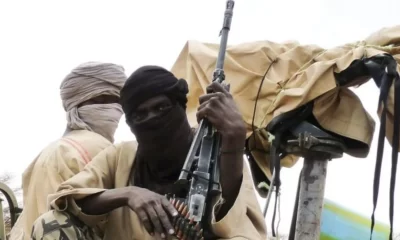
 Latest5 days ago
Latest5 days agoState of The Nation: Banditry and Self-Deception of Northern Leaders
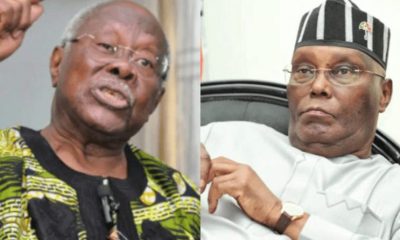
 Latest6 days ago
Latest6 days agoBode George warns PDP: “Atiku’s candidacy in 2027 could spell doom for the Party”

 News3 days ago
News3 days agoNorthern Youth President gives VeryDarkMan 48-hour ultimatum to apologize over Sultan of Sokoto comments




